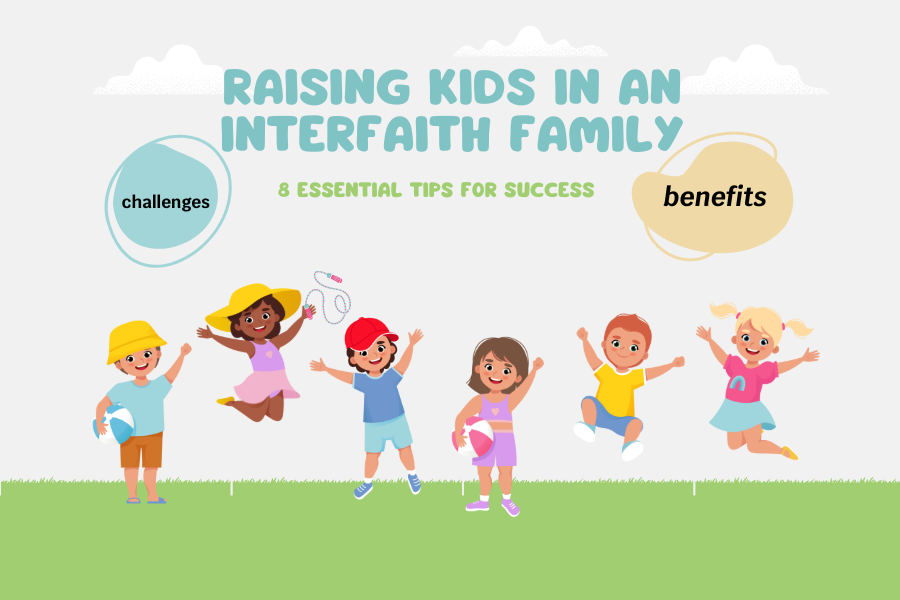
In the book “Til Faith Do Us Part”, author Naomi Schaefer Riley demonstrates that Interfaith marriage is good for society and often causes difficulties for individual families. Riley’s study reveals that numerous individuals embark on interfaith marriages without thoroughly.
Meanwhile, they may encounter some differences about the essentially spiritual, doctrinal, and practical. Couples tend to marry in their twenties and thirties, a time when religion declines in importance. They only return to their faith as they grow older and have more problems raising their children.
How to raise kids in an interfaith family comes with its own set of challenges but also provides valuable opportunities. Parents can expand children’s understanding and appreciation of various beliefs and practices. In this article, we will discover 6 common challenges, 7 key benefits, and 8 actionable tips to foster understanding and inclusivity for diverse beliefs in children
What is an interfaith family?
According to statistics over the past decade, 45% of marriages in America are interfaith1. An interfaith family consists of parents or partners from different religious backgrounds or distinct spiritual views. Such families are also referred to as mixed-faith or multi-faith families.

In interfaith families, “interfaith” doesn’t mean how religion is practiced. It doesn’t mean the couple practices two faiths at the same time, merges their faiths, or that one partner practices a faith while the other does not. It also doesn’t mean raising children in both faiths. In the context of a couple, “interfaith” simply means that each partner comes from a different faith tradition, or background.
Raising children in an interfaith family means creating a supportive environment. Parents raise their children with gentleness and composure, and all beliefs are welcomed and explored. This helps build a unique family identity and strengthens family unity.
How to Raise Kids in an Interfaith Family: 8 Essential Tips for Success!
Raising kids in an interfaith family thrives on open communication, mutual respect, and intentional planning for both traditions, focusing on shared values, celebrating diverse holidays, and creating unique family rituals that blend both backgrounds, allowing children to understand and appreciate both heritages while feeling a sense of belonging. Key steps involve discussing beliefs early, teaching both faiths, finding supportive communities, and being flexible as the family’s journey evolves.

The key to learning how to raise kids in an interfaith family lies in fostering inclusivity, and understanding. We can provide meaningful connections to their diverse heritage.
Recent studies indicate that many people are not necessarily religiously affiliated. Atheists and nonbelievers can be allowed to seamlessly integrate into family settings with those who believe in God.
Here are 8 expert-backed tips for parents on how to raise kids in an interfaith family:
1. Communication
Open communication is crucial for building a healthy family dynamic. Like the Inner Bonding process ( Dr. Erika Chopich, co-creator), it’s about sharing, not imposing our beliefs, and encouraging our daughter to express her thoughts and feelings about religion and spirituality.
Parents should regularly share their beliefs, values, and plans for raising their children. Open and honest communication is the foundation of any successful interfaith family.
2. Cultivate Respect For Both Faiths
Mutual respect is the foundation for healthy relationships, especially in interfaith families. This is because it ensures that everyone in the relationship is being treated positively.
Everyone has their own unique experiences, values, and beliefs. We can demonstrate respect by appreciating both the similarities and differences between ourselves and others.
3. Establish shared rituals
Dr. Diana Eck, Professor of Comparative Religion at Harvard University, discusses the beauty of religious diversity. Discover how shared traditions can enhance family unity and understanding.
Interfaith families can also create shared rituals that blend elements of both faiths. Establishing shared rituals fosters unity and makes significant occasions.
4. Talking To Kids About Religion
Children can learn and respect their heritage by providing books, stories, and materials. Talking To Kids About Religion can explain the essential beliefs, practices, and history of each faith.
Children can be educated about spiritual traditions, and from that, they can enhance their overall well-being and sense of identity.
5. Attending services as a group
Family can attend religious services together, even occasionally, which can be a rewarding experience. It provides children with insight into the other parent’s beliefs. We also help them appreciate the diversity of religious expression.
When we belong and participate in community life, we also can develop empathy and connection. Moreover, attending church and temple services can become one of your child’s favorite activities. From that, the community encourages them to learn and share views with those around them.
6. Encourage spiritual exploration
Parents should encourage their children to ask questions to help them develop their understanding.
This approach aligns with the educational philosophy of Dr. Carol Dweck, a psychologist at Stanford University, who advocates for a growth mindset – promoting curiosity and the willingness to learn and grow from challenges.
As children mature, they may form their own beliefs or gravitate towards one faith. Encourage their spiritual exploration and personal development. Spiritual exploration support will help them develop a broader perspective.
The spiritual exploration is the way we respect our children’s faiths. It also means we respect our honor boundaries. By setting healthy boundaries in faith with children in attitude aspects, you also demonstrate love and care for them
7. Be culturally aware
Children can be taught to be culturally aware and tolerant of others’ beliefs and practices. they will realize this is an important life lesson that will benefit them in our diverse society
8. Create a solid family identity
The importance of family ties and values should be emphasized that go beyond religious differences. Teach your children that love, generosity matter more than individual beliefs. Focus on creating family dynamics based on the values that unite you.
How To Talk To Kids About Religion?
From 2012 to 2014, approximately 7.5 million Americans lost their religious faith2. Many of these individuals are parents or will become parents in the future. So how do we, as first-generation secular parents, What do we tell them? When? And how do we talk to our kids about God and religion?
Parents have different beliefs teaching tolerance and respect for diverse viewpoints is common. It is crucial to accept that there are many truths and uncertainties when discussing religion. Besides that, especially when raising children in an interfaith family.
The key is to encourage open discussion, respect, and understanding. Parents allow children to explore and form their own beliefs in their own time.
7 Advantages of Raising Children in an Interfaith Family

1. Cultural enrichment
Interfaith children often enjoy a rich tapestry of cultural experiences. Moreover, they can learn about diverse traditions, rituals, and festivals from both sides of the family.
2. Tolerance and understanding
Interfaith families offer an ideal environment. We can foster tolerance and understanding of various belief systems. Besides that, we encourage open-mindedness from a young age.
3. Respect for diversity
Interfaith families teach children to value diversity. They can appreciate and respect cultural, religious, and ancestral differences.
4. Interpersonal skills
Interfaith children often excel in interpersonal skills. This is because they learn to navigate complex family dynamics and overcome cultural barriers.
5. Spiritual exploration
These families encourage children to explore their spirituality and beliefs. Moreover, parents allow them to find their path rather than strictly following one faith. Interfaith families often create unique rituals that combine elements of both parents’ beliefs.
6. Strong family links
We can strengthen family relationships by overcoming the challenges of co-parenting children of different religions. Parents work together to create a supportive and inclusive environment.
7. Significant global viewpoint
Children can have an essential skill by exposure to diverse faiths and cultures in today’s diverse communities.
6 challenges of Raising Kids in an Interfaith Family
Raising children in an interfaith home can be both rewarding and challenging. Here are five common issues that interfaith couples often encounter when raising kids in an interfaith family:
1. Differing religious practices and rituals
One of the most challenging aspects of living in a family with members of different faiths is navigating the various religious practices and traditions that each parent observes. It is important not to compromise on individual beliefs but to find a balanced approach.
2. Identity and confusion
Interfaith children may grapple with doubts about their religious identity. They might feel torn between their parents’ faiths or be unsure about their own beliefs, leading to feelings of uncertainty.
3. Extended family and community expectations
This can be challenging when meeting extended family and community expectations. Relatives or community members might have strong opinions or pressure the family. It is about the children’s religious upbringing, leading to tension and conflict.
Interfaith families can create a supportive environment by recognizing and addressing these challenges. We foster tolerance, respect, and appreciation for diversity. After that, promoting personal growth and family harmony.
4. Handling diverse belief systems
Interfaith families often face complex questions about different religions, especially from curious children. Parents need to handle these questions with care and respect, rather than trying to control the conversation.
Many interfaith families manage these challenges effectively by communicating openly. This helps their children gain a wider and richer view of life, faith, and culture.
5. Religious holidays
Parents should observe religious holidays because the holidays can be a source of contention. We decide which traditions to keep, which to incorporate, and how to honor the cultural significance of these celebrations. These challenges often involve balancing various religious systems, rituals, and family expectations.
6. Parental Unity
Parents need to present a united front, but differing religious views can cause tension and conflict. Parental unity greatly affects the overall harmony in the household. Therefore, parents need to communicate openly and find common ground.
7. Creative Tools for Spiritual Learning
One engaging way to help children in interfaith families explore spiritual stories and religious traditions is through creative activities like coloring. These simple yet meaningful tools allow kids to connect with the symbols, stories, and values of both faiths in a fun and age-appropriate way. For example, coloring pages that reflect cultural or religious themes can help children visually connect with important traditions and festivals.
You can find a wide range of themed printable materials at Crayon Coloring Pages, which can serve as an excellent resource for parents looking to nurture inclusivity, spirituality, and learning through art.
Final thoughts
Young children, up to around 11 or 12 years old ( Amy Armstrong, LISW, of The Center for Family Resolution in Worthington, Ohio), think in concrete terms about the world around them. Concepts like faith, spirituality, philosophy, and moral development are learned through practices and habits modeled by their caregivers, rather than through their abstract reasoning.
Hopefully, this article provides parents with valuable advice on the journey of how to raise kids in an interfaith family. From that, communicating with children instills values such as ethics and social awareness. Teaching them to take responsibility for their own beliefs helps strengthen their faith.
Sources
- ’til faith do us part: How interfaith marriage is transforming america (no date) International Center for Law and Religion Studies | ’Til Faith Do Us Part: How Interfaith Marriage is Transforming America. Available at: https://www.iclrs.org/blurb/til-faith-do-us-part-how-interfaith-marriage-is-transforming-america/
↩︎ - Russell, W.T. (2015) 10 commandments for talking to your kids about religion, PBS. Available at: https://www.pbs.org/newshour/nation/10-commandments-talking-kids-religion#:~:text=Tell%20them%20about%20religion%20from,experiment%20with%20religion%2C%20support%20them. ↩︎






